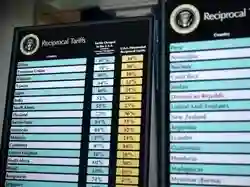Senator Chuck Grassley, a member of the Republican Party in the United States, introduced a bill that would require Congressional approval for new tariffs. This move came a day after President Donald Trump announced widespread new tariffs on various imported goods. Grassley, representing the agriculture-dependent state of Iowa, co-sponsored the ‘Trade Review Act of 2025’ with Democratic Senator Maria Cantwell of Washington. The bill mandates that Congress must approve new tariffs within 60 days of implementation, or they will be automatically blocked.
Bill Details:
-
Title: Trade Review Act of 2025
-
Sponsors: Chuck Grassley (R-Iowa) and Maria Cantwell (D-Washington)
-
Approval Process: Congress must vote on new tariffs within 60 days or they will be nullified.
Key Points:
-
Bipartisan Support: Grassley’s initiative, supported by a Democrat, underscores the importance of global trade to states like Iowa.
-
Congressional Oversight: Aimed at reining in the President’s tariff powers, the bill highlights divisions within the Republican Party.
-
Economic Concerns: Trump’s tariff measures have sparked fears of a recession and led to a major stock market downturn.
Grassley’s bill and the recent Senate action to lift Trump’s tariffs on Canadian goods, supported by four other Republican Senators, signal a rift within the party. Despite unlikely passage due to Republican backing of Trump’s stance, these legislative maneuvers reflect ongoing debates on trade policy and congressional authority.
Economic Impact and Skepticism:
-
Market Reaction: The worst Wall Street performance since 2022 followed Trump’s aggressive tariff announcement.
-
Expert Opinion: Economists express deep skepticism regarding the potential benefits of the tariffs on federal income and domestic manufacturing.
Grassley, the longest-serving current member of the U.S. Senate, avoided direct criticism of Trump. However, by invoking the constitutional authority of Congress over trade issues, he challenged the executive branch’s extensive tariff powers. While most Republicans support Trump’s stance on trade, some have voiced concerns about the broad approach and its repercussions on allies and domestic consumers.
Republican Concerns and Criticisms:
-
Targeted Tariffs: Calls for more refined tariff strategies to avoid negative impacts on U.S. allies, like those experienced with China.
-
Inconsistent Rates: Questions raised over variations in tariff levels, such as the surprise 17% tariff on imports from Israel.
-
Consumer Impact: Votes against Trump’s tariffs on Canada reflect worries about increased costs for American consumers and businesses.
Despite the minority status of Republican critics in Congress, public opinion, as indicated by a Reuters/Ipsos poll, shows significant concerns about the potential drawbacks of import tariffs. The long-standing congressional debate over trade policy, exemplified by Grassley’s bill, remains a crucial aspect of the ongoing political discourse surrounding Trump’s economic agenda.

 Museum Sejarah Nasional Menjadi Pilihan Wisatawan di Monas Saat Tugu Lengkap
Museum Sejarah Nasional Menjadi Pilihan Wisatawan di Monas Saat Tugu Lengkap